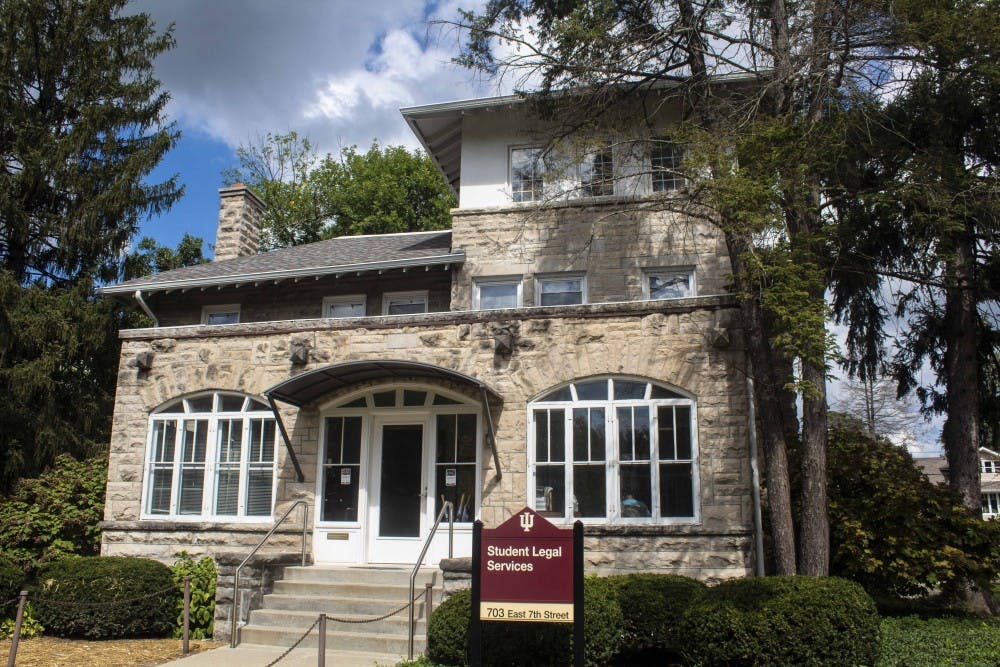All IU students pay about eight dollars every semester to Student Legal Services. What many don’t know is that means they have a lawyer when they need one.
“Where are you ever going to get a lawyer for eight dollars?” SLS staff attorney Marc Abplanalp asked. “We are your lawyers. Come see us.”
When Rachel Rogers was an undergrad at IU, she didn’t know about SLS. Now, she’s finishing up her last year at the Maurer School of Law and interning for them.
“A problem we encounter a lot is when students see us, they think, ‘Oh, that’s just for people who get drinking tickets or get caught smoking,’” she said.
SLS can’t represent students in criminal cases, cases against the University or student versus student cases. However, there's still a lot they can help with.
The office can represent students in any small claims court cases and give advice on how to proceed with criminal charges. The eight dollar payment comes out of IU’s student activities fee.
Abplanalp said about a third of the cases his office deals with involve landlord-tenant disputes. Bloomington is a college town with a captive housing market, and landlords know that many students won’t read their leases or seek legal help.
“We see leases that say things that aren’t enforceable all of the time, but that doesn’t mean they won’t try,” Abplanalp said. “For every student who comes in here, there’s probably 10 who don’t and just suck it up and pay the thousands that the landlord is asking for.”
If those students had gone to SLS, any of the office’s four staff attorneys would have looked over their lease on the spot.
Students facing criminal charges can go to SLS for advice and guidance on what to expect at the courthouse. Those charged with victimless crimes — drinking tickets, marijuana possession and others — will likely be offered entry into a pretrial diversion program by the prosecutor’s office.
Successful completion of pretrial diversion means charges will be dismissed and there will be no conviction. Abplanalp said that’s an important distinction because employers generally care whether their staff have been convicted of a crime, not charged with one.
Attorneys and interns both can give students advice on how to talk to the judge and prosecutor, how to file forms and even what to wear on the day of their trial.
Beyond standard college cases, SLS also handles a slew of other legal proceedings. Name changes, gender changes, immigration law, asylum applications, incorporating businesses and divorce — they do it all and more.
“We’re just trying to get you taken care of, so you can move on with your life and get back to your studies,” Abplanalp said.
Even in cases SLS doesn’t win, Abplanalp said it’s better to learn from your mistakes behind a paid-for college lawyer than to wait until you have to hire an attorney later in life.
He also said it’s important that students know their rights before they get in sticky situations. Abplanalp recommended being polite but firm when dealing with police.
If you've done something illegal, Abplanalp said usually the only reason police have the evidence they need to charge you with a crime is because you gave them the evidence — even though you didn't have to.
Police cannot force anyone to answer questions or consent to searches.
“It would be better if you didn’t have the Solo cup, but you don’t have to tell them what’s in the Solo cup,” he said. “If you said no to a breathalyzer, they’d have to get a warrant.”
Abplanalp said when SLS sets up tables at new student events, parents don’t like to talk to them.
“What we hear is ‘My kid’s not going to need you,’” he said. “And okay, great. I hope your kid never gets a drinking ticket, but is your kid going to live off campus? You want them to meet us and come see us and bring their lease in.”
Abplanalp said students just need to know SLS is there.
“Talk to your lawyers," Abplanalp said. "We’re your lawyers. Literally, you have a lawyer. You have four lawyers. Free lawyers.”




